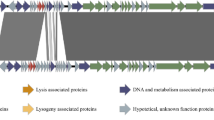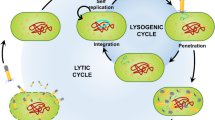Abstract.
Pseudomonas aeruginosa bacteriophage ϕKMV is a T7-like lytic phage. Liquid chromatography-mass spectrometry of the structural proteins revealed gene product 36 (gp36) as part of the ϕKMV phage particle. The presence of a lysozyme domain in the C terminal of this protein (gp36C) was verified by turbidimetric assays on chloroform-treated P. aeruginosa PAO1 and Escherichia coli WK6 cells. The molecular mass (20,884 Da) and pI (6.4) of recombinant gp36C were determined, as were the optimal enzymatic conditions (pH 6.0 in 16.7 mM phosphate buffer) and activity (4800 U/mg). Recombinant gp36C is a highly thermostable lysozyme, retaining 26% of its activity after 2 h at 100°C and 21% after autoclaving. This thermostability could prove an interesting characteristic for food conservation technology.
Similar content being viewed by others
Author information
Authors and Affiliations
Corresponding author
Additional information
Received 13 July 2004; received after revision 31 August 2004; accepted 6 September 2004
Rights and permissions
About this article
Cite this article
Lavigne, R., Briers, Y., Hertveldt, K. et al. Identification and characterization of a highly thermostable bacteriophage lysozyme. CMLS, Cell. Mol. Life Sci. 61, 2753–2759 (2004). https://doi.org/10.1007/s00018-004-4301-y
Issue Date:
DOI: https://doi.org/10.1007/s00018-004-4301-y




